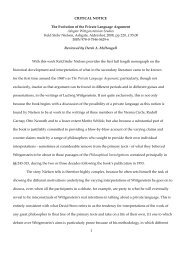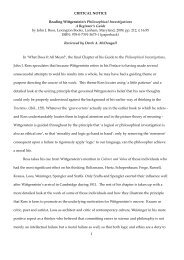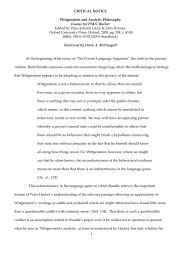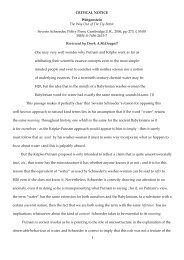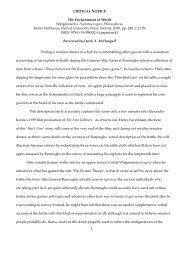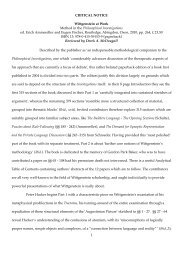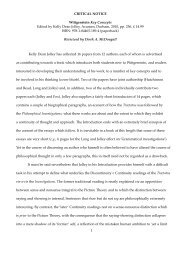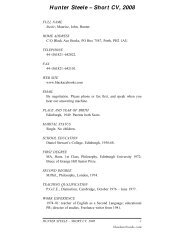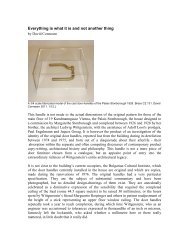Wittgenstein's Philosophical Investigations A Critical Guide
Wittgenstein's Philosophical Investigations A Critical Guide
Wittgenstein's Philosophical Investigations A Critical Guide
Create successful ePaper yourself
Turn your PDF publications into a flip-book with our unique Google optimized e-Paper software.
Having introduced these three separate camps, the naturalists who do not even read<br />
Wittgenstein, and another two sets of followers who read him very differently, it is Rorty’s aim to<br />
explore the differences between these followers in greater detail. This is quite apart from any<br />
misgivings the reader may by this point be harbouring over Rorty’s belief that the real issues at<br />
stake can even be properly discussed at this level of generality. Whilst Rorty then claims to have<br />
been persuaded ‘by reading Conant, Witherspoon, Diamond and other contributors to The New<br />
Wittgenstein’ (Ibid., 137), that with their evaluations of ‘nonsense’ and of a Wittgenstein who aimed<br />
to produce the Tractatus as a self-imploding work, they have succeeded in providing him with a<br />
truly illuminating account of Wittgenstein’s intentions, he nevertheless wishes to retain his wholly<br />
‘pragmatic’ outlook. As he earlier argues, Wittgenstein’s real contribution rests in his having been<br />
able to formulate arguments which anticipated, complemented and reinforced Quine & Davidson on<br />
the language-fact distinction, and Sellars & Brandom on knowledge by acquaintance. According to<br />
the pragmatic Wittgensteinian, ‘comparing and contrasting the writings of these later philosophers<br />
with the <strong>Philosophical</strong> <strong>Investigations</strong> helps us filter out what is merely idiosyncratic in Wittgenstein’s<br />
writings. Pragmatic Wittgensteinians do not want to recapture Wittgenstein’s own way of thinking,<br />
but rather to restate his best arguments in more effective ways’ (Ibid., 134).<br />
The reader will have heard all of this before, and from lesser philosophers than Rorty, so that<br />
even if the dispiriting effect of these observations is partly alleviated by his mildly amusing aside that<br />
‘Cest magnifique, mais ce n’est pas la guerre’ (Ibid., 137) - commenting on a resolute interpretation - he<br />
will unfortunately discover that the remainder of the paper serves only to restate Rorty’s basic claims.<br />
He observes towards its close, for example, that rather than regard philosophical talk as something<br />
which needs to be ‘elucidated out of existence’ (Ibid., 144), it should be regarded as just another, yet<br />
different way of talking, ‘on all fours with suggestions made by scientists and poets’ (Ibid.)<br />
Any reader who is even remotely inclined to see this disappointing reaction as a failure to<br />
engage with the spirit of Wittgenstein’s writings and with the way in which his approach is capable<br />
of illuminating the nature of philosophical problems, regardless of any temptation he may have to<br />
24



